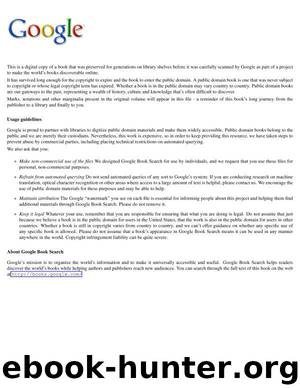The ethics of force by Warner Horace Everett 1839-

Author:Warner, Horace Everett, 1839- [from old catalog]
Language: eng
Format: epub
Tags: Peace, Arbitration, International
Publisher: Boston, Pub. by Ginn & company
Published: 1905-03-25T05:00:00+00:00
The moral aspects of the case have been so much discussed and are so well understood that I shall not here consider them. Wars will cease, I believe, only when men come to realize that they do not pay. It may be well, however, to notice that since the successful exploitation of nature requires the combined efforts of mankind, and since such a combination, resting on confidence, is dependent on the moral development of the race, then from a purely material point of view the greatest disaster is not the destruction of life and property, but the degradation of the moral status. Morally and, I believe, mentally war is a complete reversal of progress and a straight return toward the abysm from which life has emerged.
A few lesser considerations in this connection should receive brief attention. Man, it is urged, with all his great advance, remains a fighting animal. Forcible resistance to any encroachment upon his rights is as instinctive as ever. The gaudium certaminis is deeply imbedded in his nature. To take away the occasion for that supreme effort found only in battle would be to destroy the principle of the survival of the fittest, and would lead to physical degeneration. This has already been considered in part. It is perhaps sufficient to add that it is largely a mistake in fact. The instinct to fight is by no means as vigorous as with primitive man. So far as it exists, it is a survival. Neither ape nor tiger has been eliminated from man, but they are slowly dying. The physical development of man is no longer a first consideration. Mr. Fiske has noted the change of direction in human development. From the mere animal standpoint, the joy of fight is well enough for the victor; but what is it to the vanquished } To the windrows' of dead or mangled men, shot through with bullets, torn by shells, hacked with swords, trampled with hoofs, dismembered, disemboweled, joy of any sort has ceased to be even a memory.
Finally, as to the argument from the order of nature, it must be said that it is inapplicable, for the reason that civilized man is no longer in that order. Physically he is of course at the head of it; but he constitutes a genus of his own. As a member of society he is living almost entirely under artificial conditions. He cannot escape his physical nature, to be sure, without ceasing to live; but he has modified it in many ways, bringing it into
subjection to ideals of right rather than to the promptings of inherited appetites. It matters not that the new conditions are self-imposed. They exist and control men just as truly, if not as extensively, as the purely natural conditions.
Another argument gravely put forth is of much greater importance seemingly than in fact. All government, we are told, is in the last analysis based upon physical force. Law has no self-executing power, and wherever it is disregarded or is inadequate to preserve order the military force must be called in.
Download
This site does not store any files on its server. We only index and link to content provided by other sites. Please contact the content providers to delete copyright contents if any and email us, we'll remove relevant links or contents immediately.
The Thirst by Nesbo Jo(5791)
Permanent Record by Edward Snowden(5006)
The Myth of the Strong Leader by Archie Brown(4795)
Spare by Prince Harry The Duke of Sussex(4216)
A Higher Loyalty: Truth, Lies, and Leadership by James Comey(4038)
Secrecy World by Jake Bernstein(3788)
Adulting by Kelly Williams Brown(3678)
The Borden Murders by Sarah Miller(3592)
Fear by Bob Woodward(3263)
Killers of the Flower Moon by David Grann(3255)
The Last Girl by Nadia Murad(3060)
The Secret Barrister by The Secret Barrister(3010)
Future Crimes by Marc Goodman(3005)
American Kingpin by Nick Bilton(2981)
Liar's Poker by Michael Lewis(2818)
The House on Mango Street by Sandra Cisneros(2780)
Graduate Admissions Essays, Fourth Edition: Write Your Way into the Graduate School of Your Choice (Graduate Admissions Essays: Write Your Way Into the) by Asher Donald(2478)
Delicious Torment by Linsey Lanier(2449)
Camino Island by John Grisham(2390)
